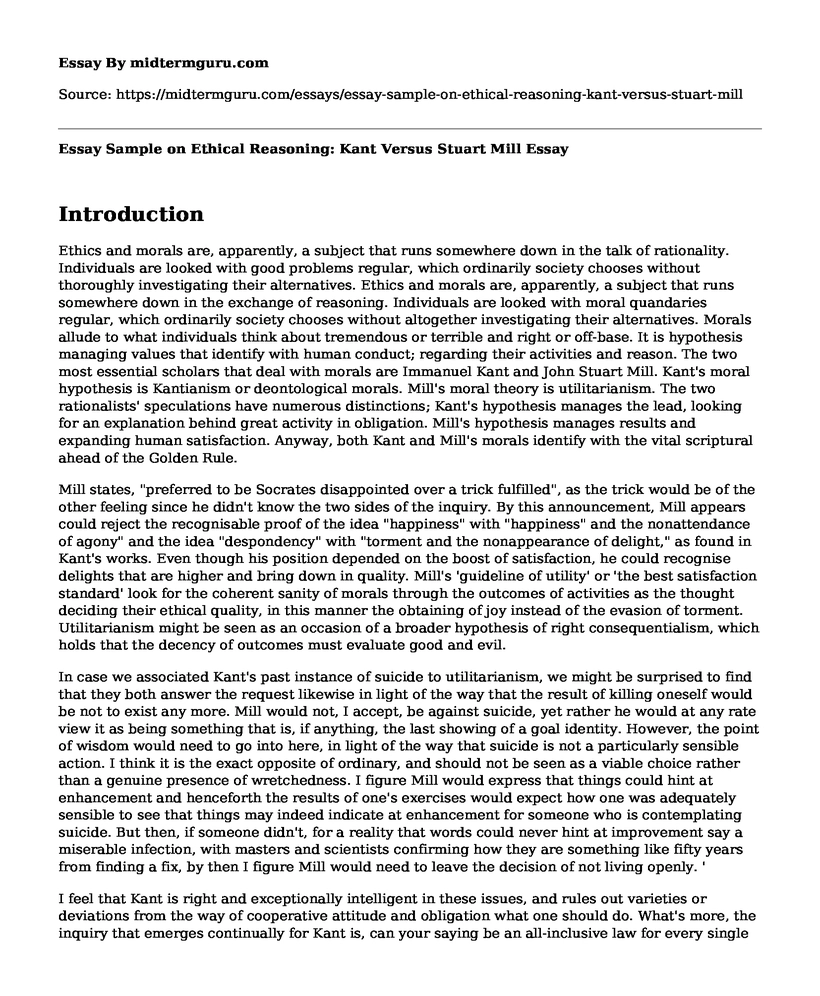Introduction
Ethics and morals are, apparently, a subject that runs somewhere down in the talk of rationality. Individuals are looked with good problems regular, which ordinarily society chooses without thoroughly investigating their alternatives. Ethics and morals are, apparently, a subject that runs somewhere down in the exchange of reasoning. Individuals are looked with moral quandaries regular, which ordinarily society chooses without altogether investigating their alternatives. Morals allude to what individuals think about tremendous or terrible and right or off-base. It is hypothesis managing values that identify with human conduct; regarding their activities and reason. The two most essential scholars that deal with morals are Immanuel Kant and John Stuart Mill. Kant's moral hypothesis is Kantianism or deontological morals. Mill's moral theory is utilitarianism. The two rationalists' speculations have numerous distinctions; Kant's hypothesis manages the lead, looking for an explanation behind great activity in obligation. Mill's hypothesis manages results and expanding human satisfaction. Anyway, both Kant and Mill's morals identify with the vital scriptural ahead of the Golden Rule.
Mill states, "preferred to be Socrates disappointed over a trick fulfilled", as the trick would be of the other feeling since he didn't know the two sides of the inquiry. By this announcement, Mill appears could reject the recognisable proof of the idea "happiness" with "happiness" and the nonattendance of agony" and the idea "despondency" with "torment and the nonappearance of delight," as found in Kant's works. Even though his position depended on the boost of satisfaction, he could recognise delights that are higher and bring down in quality. Mill's 'guideline of utility' or 'the best satisfaction standard' look for the coherent sanity of morals through the outcomes of activities as the thought deciding their ethical quality, in this manner the obtaining of joy instead of the evasion of torment. Utilitarianism might be seen as an occasion of a broader hypothesis of right consequentialism, which holds that the decency of outcomes must evaluate good and evil.
In case we associated Kant's past instance of suicide to utilitarianism, we might be surprised to find that they both answer the request likewise in light of the way that the result of killing oneself would be not to exist any more. Mill would not, I accept, be against suicide, yet rather he would at any rate view it as being something that is, if anything, the last showing of a goal identity. However, the point of wisdom would need to go into here, in light of the way that suicide is not a particularly sensible action. I think it is the exact opposite of ordinary, and should not be seen as a viable choice rather than a genuine presence of wretchedness. I figure Mill would express that things could hint at enhancement and henceforth the results of one's exercises would expect how one was adequately sensible to see that things may indeed indicate at enhancement for someone who is contemplating suicide. But then, if someone didn't, for a reality that words could never hint at improvement say a miserable infection, with masters and scientists confirming how they are something like fifty years from finding a fix, by then I figure Mill would need to leave the decision of not living openly. '
I feel that Kant is right and exceptionally intelligent in these issues, and rules out varieties or deviations from the way of cooperative attitude and obligation what one should do. What's more, the inquiry that emerges continually for Kant is, can your saying be an all-inclusive law for every single sane subject?' One should dependably make that inquiry when settling on the legitimacy and extendibility of a proverb of moral merit. Along these lines, we would now be able to see that reason and levelheadedness assume and ever vital job in choosing the structure of an ethical framework because, as it is stated, all people are reasonable creatures, and in this way, all moral adages are universalisable to every single discerning specialist. Traditions may vary, societies may contrast, yet noble quality must be the equivalent all over. What's more, this driven Kant to state that reason and reasonability are one in the equivalent with the specialist and expression of God.
Conclusion
In my view, the most ethical theory is Kant's. This is because, in elucidating the explanation behind moral quality, he says that morals should be universalised and this as I might want to think outlines a common purpose behind judgment of what isn't right or right. In what capacity may we have the ability to condemn on account of submitting murder is morally upstanding or not, in case we presented it to sentiments and the desire to search for joy? If this was the commence on which we condemned transgressors, by then, I figure everyone would go scot-free given that they induced happiness to do whatever wrong they did. By then we have no inspiration to condemn or repel them because, in their eyes, they have done nothing inaccurately, they searched for enjoyment and fulfilment. After all, there are no legal orders for having emotions, all we get are non-legitimate consents like separation for harbouring estimations, for instance, want or shock, yet they are not meriting law.
Cite this page
Essay Sample on Ethical Reasoning: Kant Versus Stuart Mill. (2022, Oct 05). Retrieved from https://midtermguru.com/essays/essay-sample-on-ethical-reasoning-kant-versus-stuart-mill
If you are the original author of this essay and no longer wish to have it published on the midtermguru.com website, please click below to request its removal:
- Essay on Social Ethics in Action
- Problem Identification and Background in Social Framework - Essay Sample
- Paper Example on Philosophy: Brave New World and Utilitarianism
- The Marxist Alienation - Essay Sample
- Essay Sample on Plato and Rachel's Concepts of the Origins and Value of Selfishness
- Political Realism: Explaining Power in Politics - Essay Sample
- Paper Example on Utilitarianism Approach







